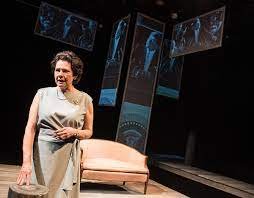Renaissance Theaterworks Closes Season with a Tribute to Rose Kennedy
Renaissance Theaterworks finishes its 2021-2022 season with Rose, a compelling one-woman show examining the life of famed matriarch Rose Fitzgerald Kennedy. Directed by Elizabeth Margolius and featuring award-winning Chicago actor Linda Reiter, Rose looks at the early life, influences, and expectations of an extraordinary woman from one of America’s most celebrated families. Boston Irish Catholic, she was the daughter, wife, and mother of famous politicians; a woman who lived from the Gilded Age to the computer age (1890-1995), suffering much more than her share of tragedies on a very public stage.
Wisely, the play’s author, Laurence Leamer, focuses the play on one particular day in July, 1969, when a potential biographer has come to the Kennedy residence in Hyannis Port, Massachusetts, to record an interview for his book on Rose’s life. Unfortunately the family is in chaos at that moment, since Rose’s youngest son Edward Kennedy has just been involved in a car crash and the scandal around the subsequent death of his passenger threatens his political career and the legacy of the family.
Ever conscious of maintaining her composure in front of others, she begins the interview with an unseen journalist looking like a proper society woman, in a tasteful and flattering iron blue dress accessorized with pearls and a matching brooch. (Costume design by Jazmine Aurora Medina.) As she waits for Teddy to come back from an afternoon of sailing, Rose’s narrative becomes more frayed with worry, and tinged with doubt and regret about the choices she’s made, and those that were made for her. A ringing phone interrupts the flow of her thoughts and ups the ante each time the caller is not her errant son. Talking to various daughters and daughters-in-law, we clearly see her pragmatic, stoic side, as she tries to maintain her outwardly perfect family.
Rose’s storytelling is aided by a photo album. As she turns pages, looking at pictures of weddings, new babies, and family outings, the audience sees these actual black and white photos of the Kennedys projected onto screens that hang in boxes over the stage like pictures on the invisible walls. (Beautiful projections by John Medina.) Through these portraits, Reiter’s Rose is revealed as a woman of her time, a victim of both the male dominated society and a patriarchal church, and a necessary prop to aid her families’ political ambitions. Just as she is thwarted and manipulated by her father, she is thwarted and manipulated by her husband, which is made visually clear by the set, a series of seaside docks that hem her in, in a tight square. (Inventive scenic design by Lauren Nichols.)
The oppressed becomes the oppressor as she stands by while her children are similarly dispatched to Ivy League schools, unhappy marriages, or medical procedures, depending on their gender and abilities. Undemonstrative in her love to her offspring and strict in her demands that they each act for the good of the family, it is easy to see her shortcomings. It is also easy to see the pain that she endures, due to her husband’s affairs, Joe, Robert, and John Kennedy’s violent deaths, and her daughter Rosemary’s erasure. Rose’s “stiff upper lip” facade rises and recedes as necessary – Reiter’s thorough understanding of this character (that she’s played multiple times) allows her to easily dip into honesty and regret for a few moments before remembering her duties. The performance is well paced and nuanced, never slipping into melodrama or self-pity, and the urgency of the evening grows steadily, until she finally reminds her distraught son Teddy that he has no choice but to do “the right thing” for his family and career.
While the portrayal of Rose Kennedy is intriguing, Rose is designed to be enjoyed by audiences with clear memories of America’s Camelot. The drama swelling underneath the picture-perfect family is only gripping if it contradicts your own recollections or adds subtext to stories you know well. As a Gen-Xer whose only memories of a Kennedy tragedy are TV segments covering JFK Jr.’s death in a plane crash in 1999, many of the revelations included in the play were lost on me, and without an emotional connection to members of the Kenndy family, the stakes felt low.
That said, the audience on Wednesday night was enchanted with the play and the opportunity to revisit a woman they thought they knew, realizing that she was much more than simply the mother of heroes.



